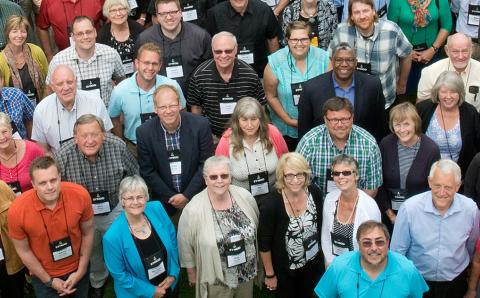Synod 2016 rejected the 2 percent increase in ministry shares funds proposed by the Christian Reformed Church’s Board of Trustees, instead holding the line at the current amount of $339.48 per active adult member. Ministry shares are the monies collected to support the denomination’s shared ministries.
Not only is this the first time in recent memory that synod did not grant a requested increase, but it also wants an overhaul of the system itself. Faced with a system that has been slowly eroding, with the actual amount collected now at less than 60 percent of full funding, synod decided it was time to “reimagine” the system.
The ministry shares system has long been defended as an efficient and low-cost way of raising necessary funds. Denominational director of finance and operations John Bolt said that there are very few costs associated with raising roughly $24 million through the ministry shares system. The remaining $16 million needed for the denominational budget, in contrast, requires $4 million in fund raising costs.
The board itself had appointed a task force to make recommendations to improve the system. Synod took its direction from the task force’s report.
Synod’s first instruction is for the Board of Trustees to “to evaluate and prioritize all existing programs and ministries with the goal of reducing the institutional footprint.” Part of that evaluation is to evaluate every denominational ministry to see whether it still reflects the will of synod and, therefore presumably, the people in the pews.
The goal, said delegate William Delleman, Classis Alberta North, is to reduce “ministry creep.” Kathy Vandergrift, president of the board, said that the board already reviews programs regularly and that this is the purpose of the denominational ministry plan.
Several delegates thought that the problems with the ministry shares system arise from a failure of communication. Vern Swieringa, Classis Zeeland, said, “The reason we have a problem is that [members] just don’t know what we are doing together.”
Another piece of the overhaul is to place increased responsibility on the classes (regional clusters of churches) for increasing congregational participation in the ministry shares system. The original language required that classes “intervene with, encourage, and confront churches that do not contribute to the ministry shares system.” Delegates objected to this language, pointing out that classes don’t respond well to this. Matthew Haan, Classis Iakota, said that classes don’t like synod to “tell us what to do.” Drew Sweetman, speaking for the committee that proposed the changes, responded by saying, “Synod is the voice of the church.”
In the end, the language about intervening and confronting non-paying churches was withdrawn, and in its place synod used softer language, leaving it to the Board of Trustees to propose just what that process would look like.
Synod also asked the board to “reimagine ministry shares,” to fund the ministries and programs the denomination has agreed upon but with a simplified way to calculate a church’s share other than counting members. For example, Sweetman said, two classes, Muskegon and Illiana, calculate their ministry shares using a percentage of church budgets rather than membership numbers.
Laryn Zoerhof, Classis Illiana, pointed out some of the difficulty with calculating ministry shares in this way. He said it required a careful examination of congregational budgets, since what is called one thing in one budget is called something else in another. Only then could the calculation be made.
In refusing to grant the ministry shares increase proposed by the Board of Trustees, some delegates suggested the amount didn’t matter. Rob Buikema, Classis Wisconsin, said, “The number keeps going up, and it becomes a fictional number,” since the amount actually paid into the ministry shares system remains roughly the same, regardless of the number. A chart posted by a delegate showed that the amount collected over the past decade as constant while the ministry shares number has steadily increased.
Others spoke of the pain of making cuts, even at the 2 percent level, when ministry budgets have already been established. Bolt said that will amount to $200,000 less income. Vandergrift said that something will have to give. But delegates voted 112-65 to fund 2017 ministry shares at the same level as they are currently funded.
At the end of the discussion, executive director Steve Timmermans, addressed delegates. He said in listening to the whole debate he often heard language that distinguished between “us” and “the denomination.” “You are the denomination,” he said. He added that he heard both hope and frustration in the discussion. But, he said, “We are going to get better.” He mentioned the ministry plan and evaluations of ministries that will come with the ministry plan, and he held out hope that the new Council of Delegates adopted at last year’s synod would help, bringing us all around the table. He concluded, “We are the church together.”
Synod 2016 is meeting at Calvin College in Grand Rapids, Mich., from June 10-17. For continuous Banner coverage, please follow The Banner Magazine on Facebook or @crcbanner on Twitter. You can find more tweeting by following hashtag #crcsynod. News stories will be posted at thebanner.org several times daily. For CRC Communications releases, webcast, and live blogging, please visit crcna.org/synod. Unless noted otherwise, all photographs are by Karen Huttenga.
About the Author
Clayton Libolt was the long time pastor of River Terrace Church in East Lansing, Mich. Since his retirement, he has served in a variety of interim positions. He is presently serving as the interim senior pastor of Sonlight Community CRC in Lynden, Wash.









